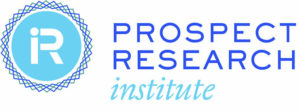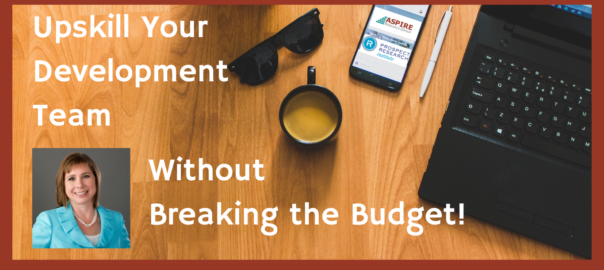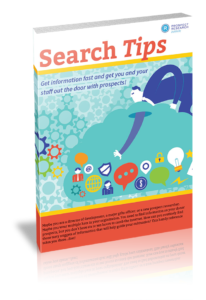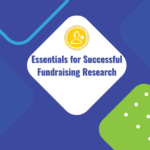When people hear “prospect research” they often assume that prospect research is a software or using Google to find things like company bios or, sometimes, that it is an employee that creates prospect profiles. Usually, the definition relates to the kind and scale of development operations they have been exposed to. And, really, everyone is as correct as they are wrong!
When we consider the growth of an organization from start-up to raising billions of donor dollars, the core of prospect research is the act of better understanding your donors through data and information.
Even if you have the luxury of a full-time, prospect research professional, everyone on the development team needs to be good at some basic prospect research skills. And if you don’t have the luxury of having a prospect research professional on staff, there are great ways to upskill existing staff to provide additional research support.
Finding contact and occupation
When it comes to personally asking a donor for a gift – most often in a mid-level or major gift program – the first thing you need is contact information: address, phone, email, or social media.
Hand-in-hand with contact information is the donor’s occupation. Occupation is useful for a few reasons:
- Finding business contact information is easier and usually more accurate.
- Psychologically, at work we probably expect to be contacted by people we don’t know more than at home.
- Especially in higher education, development officers can connect with donor prospects on LinkedIn, if appropriate.
- Occupation is a quick and easy indicator of likely wealth.
Everyone on the development team needs to be good at finding basic information about donors and this is why Aspire and the Prospect Research Institute created the booklet, Search Tips for Fundraising Research.
This 15-page booklet introduces the five fundamental building blocks for fundraising research and gives you tips, tricks, and resources to find what you need. Purchase your copy today!
Information is great – when it’s accurate!
Once everyone is upskilled on basic search — from the president’s assistant to major gift officers to the database administrator and beyond – it’s time to address whether the information everyone is finding is correct.
The proliferation of misleading and outright erroneous information can be overwhelming. As anyone who has clicked through a scam email knows (and c’mon, we’ve all fallen for one at least once!), when you’re busy, stressed, or preoccupied, it’s difficult to maintain a critical, watchful eye for discrepancies or take the time to double-check information.
At Aspire, we were once asked to perform due diligence research on a donor prospect with whom the organization was in negotiations for a major gift. Beyond reputational risk, the question was whether he actually had the wealth he claimed to have.
It was super challenging! Why? Because the information we sourced seemed to be in a perpetually unconfirmable loop. For example, what appeared to be a published interview was really his own blog article. Live media interviews only seemed to cite information that he had seeded in his biographies and multitude of websites.
And the worst? He claimed to have bought out dozens of bankrupt companies – all incorporated in Delaware with no owner information published!
After hours of creative searching, we finally found the fatal flaw and it was in plain sight. If you tried to purchase any of the products or services on offer through the various companies there was either no option to purchase on the website or no physical address to visit.
Finding accurate information is so important, the Prospect Research Institute created a FREE course to educate your development team (and anyone really) – Solid Intel.
Solid Intel is a multi-module course teaching you how to evaluate sources critically and feel confident in the accuracy of the information you present. Fun quizzes test your comprehension. Share with your team and Enroll Today.
Wealth and philanthropy indicators
If your organization needs deeper research to support major gifts and hasn’t had this support previously, you may want to upskill an existing staff member, such as a development coordinator or database administrator.
You probably have a few specialty tasks you’d like this person to accomplish, such as the following:
- Identify major gift prospects from the database
- Provide prospect profiles prior to solicitation
- Help coordinate moves management for the team
Leveraging your existing staff member or hiring someone at entry level can be economical and helps build internal capacity for upgrading donors and moving toward major gifts. In the past, training a staff member on prospect research support for the growing nonprofit was challenging.
Prospect research industry conferences are expensive and dominated by sophisticated healthcare and higher education environments. Webinars and local conferences offer tidbits, but usually don’t give your researcher key skills with step-by-step instruction on how to apply the skills to their work.
Recognizing the need, Aspire developed a course at the Prospect Research Institute specifically for the nonprofit researcher that needs to do all the research things – and at an economical price.
The Essentials for Successful Fundraising Research course is at least 7 to 8 weeks of on-demand content with a downloadable textbook, homework feedback, ability to earn a digital badge demonstrating competency, and 12 months of monthly group coaching. Give your organization the research edge. Enroll Today!
Growing your Fundraising with Research
When your development team has the information it needs, big things – and gifts – can happen!
- Routine stewardship can happen with better contact information
- Stewardship calls can turn into major gift prospect qualification
- Donors can be moved more methodically toward larger gifts
- Deeper information can give development officers greater confidence to ask for larger gifts
Upskilling your development team doesn’t have to break the bank. Aspire, through the Prospect Research Institute, has created a variety of training options to meet your needs at affordable prices.
 What are you waiting for?
What are you waiting for?
Visit the Institute now!




